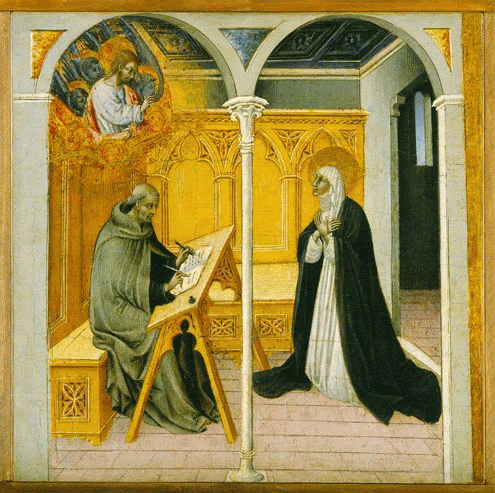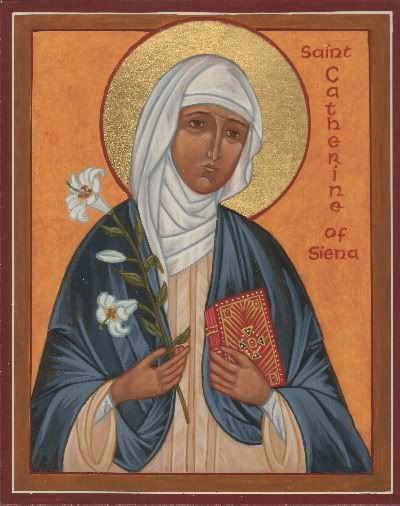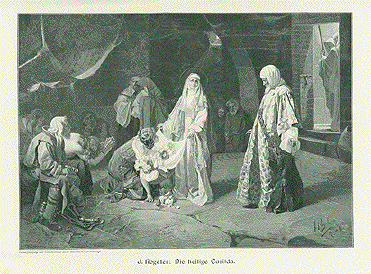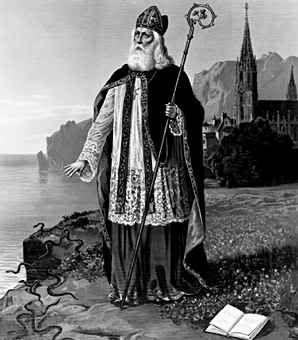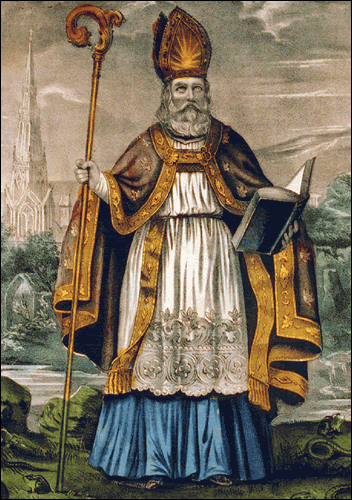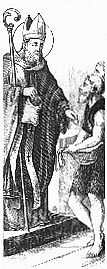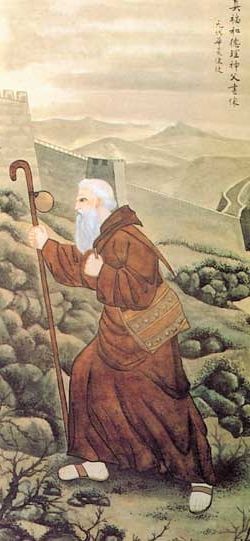Saint Catherine was born the 23rd child of a poor wool dyer in Northern Italy. She was marked by the sign of holiness from a young age, clearly experiencing visions by the age of six in which she saw both her neighbors and their guardian angels simultaneously. That same year, at age 6, she was observed to fall into a religious ecstasy while reporting a vision of Christ, dressed as the pope, and the apostles. In her vision, Christ blessed her, anointing her with her earthly mission. As she aged, her intelligence and beauty grew, along with her piety. As she approached marrying age, her mother encouraged her to look for a spouse, but Catherine instead cut off her hair (to make herself less attractive) and committed herself to a life of prayer and meditation, consecrated a virgin bride of Christ. While her mother was distraught, her father encouraged her, setting aside a room of the family’s small home for Catherine to use in pursuit of her spiritual endeavors.
At age sixteen, Catherine took the habit of the Dominican Tertiaries (Third Order of Saint Dominic), where she continued to have ecstatic visions of Christ, Our Blessed Mother, and the saints. During these visions, she engaged in familiar conversations with Christ over three years, and underwent the mystical experience of “mystical espousal” to Christ.
Despite her lack of formal education, the writings of Saint Catherine are regarded as treasures of the Church, and her mind one of the most brilliant theological minds throughout the ages. She was a prolific writer, the most famous of her works being The Dialogue, which she dictated while experiencing her ecstatic visions and conversations with Christ. In this work, she expounds on the mysteries of the Church, the Creed, the sinfulness of man, and the divine mercy of the Lord.
Saint Catherine experienced visions of both heaven and hell while on earth. She worked tirelessly, through letters (over 400!) and counsel to church and world leaders—including Pope Gregory XI and various kings and queens of the time. Her goal was church reform, inspired by her visions of Christ, and her call to public service. Saint Catherine devoted her free time to the poor and ill, and the conversion of sinners. Five years prior to her death, Catherine was graced with the stigmata, although she kept this a secret due to her humility. Saint Catherine is said to have eaten very little during her life, with the exception of Holy Eucharist each day. She bore continuous stomach ailment and discomfort without complaint, uniting her suffering to that of Christ. Saint Catherine engaged in severe forms of mortification, wearing a metal shirt which cut into her hips, beating herself with a chain for her own sins (and those of others), sleeping on a wooden bench, and oftentimes refusing to speak. For Catherine, the greater her suffering, the greater the triumph of heaven!
During her lifetime, the Church experienced great turmoil, which Catherine sought to reconcile. She offered herself and her life as a victim for the Church in it’s agony. Saint Catherine died when she was only 33, and upon exhumation of her body over 100 years later, was found to be incorrupt. Her head and thumb, miraculously smuggled out of Rome during time of persecution (upon examination by guards, the bag in which her head was hidden was observed to be filled with rose petals, but upon moving past the guards, the roses disappeared and the holy face of Saint Catherine returned), were returned to Siena, where they remain incorrupt in the Basilica of San Domenico. Numerous miracles have been recorded through her intercession.
The life and inspiration of Saint Catherine of Siena can best be found in her words, preserved in over 400 letters written in her hand, numerous prayers, as well as in The Dialogue. Selected quotations are presented below. The words of Saint Catherine remind us of our faith, of our weakness and sinfulness, and of the unending love and mercy of the Lord. In her words, everything we do should begin in love—love for our neighbors, love for our Lord, love for ourselves. The Lord does nothing without love in mind, and Saint Catherine reminds us that neither should we!
Selected Writings of Saint Catherine of Siena
“So take a lesson from the true father and shepherd. For you see that now is the time to give your life for the little sheep who have left the flock. You must seek and win them back by using patience and war–by war I mean by raising the standard of the sweet blazing cross and setting out against the unbelievers. so you must sleep no longer, but wake up and raise that standard courageously. I am confident that by God’s measureless goodness you will win back the unbelievers and [at the same time] correct the wrongdoing of Christians, because everyone will come running to the fragrance of the cross, even those who have rebelled against you most.”
“No one should judge that he has greater perfection because he performs great penances and gives himself in excess to the staying of the body than he who does less, inasmuch as neither virtue nor merit consists therein; for otherwise he would be an evil case, who for some legitimate reason was unable to do actual penance. Merit consists in the virtue of love alone, flavored with the light of true discretion without which the soul is worth nothing."
"If not for my sins, the world would be a better place."
“You know that the devil is not cast out by the devil, but by virtue.”
"There is no perfect virtue-none that bears fruit- unless it is exercised by means of our neighbor."
“Charity is the sweet and holy bond which links the soul with its Creator: it binds God with man and man with God.”
“Eternal Trinity, Godhead, mystery deep as the sea, you could give me no greater gift than the gift of yourself. For you are a fire ever burning and never consumed, which itself consumes all the selfish love that fills my being. Yes, you are a fire that takes away the coldness, illuminates the mind with its light, and causes me to know your truth. And I know that you are beauty and wisdom itself. The food of angels, you gave yourself to man in the fire of your love.”
“Everything comes from love, all is ordained for the salvation of man, God does nothing without this goal in mind.”
“And let the truth be your delight; let it always be in your mouth, and proclaim it when it is needed. Proclaim it lovingly and to everyone, especially those whom you love with a special love---but with a certain congeniality, putting the shortcomings of the other person on your own shoulders. If in the past you haven't done it as sensitively as you should, let's do better in the future.”
“I long to see you a productive tree planted in fertile soil and laden with sweet mellow fruit. For a tree uprooted from the soil (I mean the soil of true self-knowledge) would dry up and bear no fruit.”
“We lack nothing but virtue and hunger for the salvation of souls---but there is a remedy for this, father: that we do away with loving ourselves or anyone or anything else apart from God. Let us concentrate no longer on friends or relatives or on our own material needs, but only on virtue and the promotion of spiritual matters. For the only reason you are wanting for material things is your abandonment of concern for the spiritual.”
“Learn from the Master of truth, who preached virtue only after he had practiced it.... To this wonderful school, then, my children!... Open your ears, I tell you, to hear his teaching --- and it is this: voluntary poverty; patience in the face of injury; returning good to those who do us evil; being little, humble, oppressed and forsaken in the world; with ridicule, torment, wrongs, insults, detraction, gossip, difficulties, and harassment from the world.... No more indifference, then! No more sleeping in unawareness! No, with bold and blazing heart stretch your sweet loving desires to go and give honor to God and your best efforts to your neighbors, never losing sight of your objective, Christ crucified.”
"Love is the most necessary of all virtues. Love in the person who preaches the word of God is like fire in a musket. If a person were to throw a bullet with his hands, he would hardly make a dent in anything; but if the person takes the same bullet and ignites some gunpowder behind it, it can kill. It is much the same with the word of God. If it is spoken by someone who is filled with the fire of charity- the fire of love of God and neighbor- it will work wonders."
"Everything comes from love, all is ordained for the salvation of man, God does nothing without this goal in mind."
"Merit consists in the virtue of love alone, flavored with the light of true discretion without which the soul is worth nothing."
"Strange that so much suffering is caused because of the misunderstandings of God's true nature. God's heart is more gentle than the Virgin's first kiss upon the Christ. And God's forgiveness to all, to any thought or act, is more certain than our own being."
“When then, eternal Father, did you create this creature of yours?…You show me that you made us for one reason only: in your light you saw yourself compelled by the fire of your love to give us being in spite of the evil we would commit against you, eternal Father. It was fire, then, that compelled you. Oh, unutterable love, even though you saw all the evils your creatures would commit against your infinite goodness, you acted as if you did not see and set your eye on the beauty of your creature, with whom you had fallen in love like one drunk and crazy with love…You are the fire, nothing but a fire of love, crazy over what you have made.”
“My Lord, turn the eye of your mercy on your people and on your mystic body, holy Church. How much greater would be your glory if you would pardon so many and give them the light of knowledge! For then they would surely all praise you, when they see that your infinite goodness has saved them from deadly sin and eternal damnation. How much greater this than to have praise only from my wretched self....
So I beg you, divine eternal love, to take your revenge on me, and be merciful to your people. I will not leave your presence till I see that you have been merciful to them.”
Prayers Composed by Saint Catherine of Siena
Holy Spirit, come into my heart, by your power I journey to You, God, and grant me charity with fear. Protect me, o Christ, from every evil thought, warm me with Your sweet love, so that each burden seems light to me. My holy Father and my sweet Lord, help me always in all my endeavors, Christ love, Christ love. Amen.
Precious Blood,
Ocean of Divine Mercy:
Flow upon us!
Precious Blood,
Most pure Offering:
Procure us every Grace!
Precious Blood,
Hope and Refuge of sinners:
Atone for us!
Precious Blood,
Delight of holy souls:
Draw us! Amen.
















